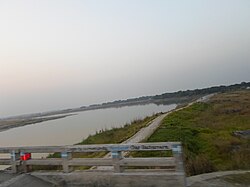Shibchar (Bengali: শিবচর) is an upazila of Madaripur District in the Division of Dhaka, Bangladesh.[4]
Shibchar
শিবচর | |
|---|---|
 Mawa Bhanga Bridge | |
 | |
| Coordinates: 23°21′00″N 90°10′00″E / 23.3500°N 90.1667°E | |
| Country | |
| Division | Dhaka |
| District | Madaripur |
| Area | |
| • Total | 332.90 km2 (128.53 sq mi) |
| Population | |
| • Total | 357,437 |
| • Density | 1,100/km2 (2,800/sq mi) |
| Time zone | UTC+6 (BST) |
| Postal code | 7930[2] |
| Area code | 06624[3] |
| Website | shibchar |
Geography
editShibchar is located at 23°21′00″N 90°10′00″E / 23.3500°N 90.1667°E. It has 69,623 households and total area 332.90 km2. The upazila is bounded by Padma river, Lohajang and Sadarpur upazilas on the north, Rajoir and Madaripur Sadar upazilas on the south, Zajira upazila on the east, Bhanga upazila on the west.
Materials
editLeather shields were made from a great variety of animals found in the Indian subcontinent. The hide shields were made from either water buffalo, sambar deer, Indian elephant, or Indian rhinoceros. The rhinoceros shields were the most prized variant among leather shields.[5]
Main water bodies in the upazila include Padma river, Kumar river, Arial Khan river, and Moynakata.
Demographics
editAccording to the 2011 Census of Bangladesh, Shibchar Upazila had 69,623 households and a population of 318,220. 77,623 (24.39%) were under 10 years of age. Shibchar had a literacy rate (age 7 and over) of 43.47%, compared to the national average of 51.8%, and a sex ratio of 1033 females per 1000 males. 32,111 (10.09%) lived in urban areas.[7][8]
As of the 1991 Bangladesh census, Shibchar had a population of 306082. Males constituted 51.46% of the population, and females 48.54%. This Upazila's eighteen up population was 143975. Shibchar had an average literacy rate of 26.9% (7+ years), and the national average of 32.4% literate.[9]
Administration
editShibchar Thana was formed in 1930 and it was turned into an upazila in 1983.[4]
Shibchar Upazila is divided into Shibchar Municipality and 19 union parishads: Bahertala Dakshin, Baheratala Uttar, Bandarkhola, Baskandi, Charjanazat, Dattapara, Ditiyakhando, Kadirpur, Kathalbari, Kutubpur, Madbarerchar, Nilokhe, Panchar, Sannasirchar, Shibchar, Shiruail, Umedpur, Vhadrasion, and Vhandarikandi. The union parishads are subdivided into 108 mauzas and 519 villages.[7]
Shibchar Municipality is subdivided into 9 wards and 17 mahallas.[7]
See also
editReferences
edit- ^ National Report (PDF). Population and Housing Census 2022. Vol. 1. Dhaka: Bangladesh Bureau of Statistics. November 2023. p. 398. ISBN 978-9844752016.
- ^ "Bangladesh Postal Code". Dhaka: Bangladesh Postal Department under the Department of Posts and Telecommunications of the Ministry of Posts, Telecommunications and Information Technology of the People's Republic of Bangladesh. 21 October 2024.
- ^ "Bangladesh Area Code". China: Chahaoba.com. 18 October 2024.
- ^ a b Md. Shajahan Khan (2012), "Shibchar Upazila", in Sirajul Islam and Ahmed A. Jamal (ed.), Banglapedia: National Encyclopedia of Bangladesh (Second ed.), Asiatic Society of Bangladesh
- ^ Ciuk, Krzysztof; Woodward, Susan. "Shields of dreams: Mughal dhals sport "designer label" rhino". ROM: Magazine of the Royal Ontario Museum; Toronto. 34: 5 – via ProQuest.
- ^ Population and Housing Census 2022 - District Report: Madaripur (PDF). District Series. Dhaka: Bangladesh Bureau of Statistics. June 2024. ISBN 978-984-475-256-6.
- ^ a b c "Bangladesh Population and Housing Census 2011 Zila Report – Madaripur" (PDF). bbs.gov.bd. Bangladesh Bureau of Statistics.
- ^ "Community Tables: Madaripur district" (PDF). bbs.gov.bd. Bangladesh Bureau of Statistics. 2011.
- ^ "Population Census Wing, BBS". Archived from the original on 2005-03-27. Retrieved November 10, 2006.